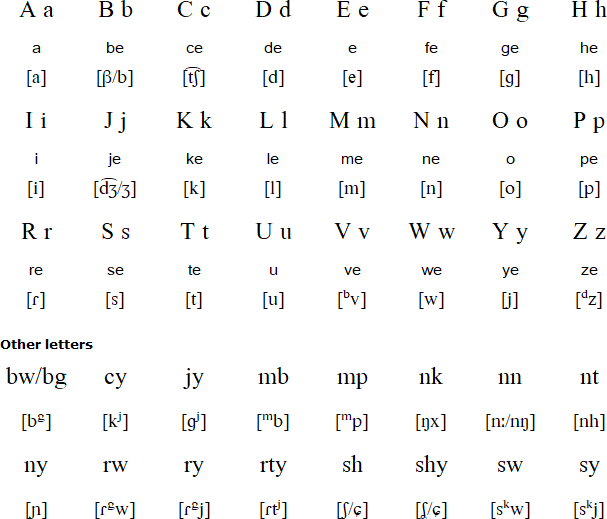Kirundi is a Bantu language with about 11.2 million speakers, mainly in Burundi, and in Rwanda, Tanzania, Kenya and other countries. There are about 10.4 million speakers of Kirundi in Burundi, about 565,000 in Rwanda, and about 246,000 in Tanzania. There are smaller numbers of Kirundi speakers in the Democratic Republic of the Congo and Uganda.
Kirundi is one of the official languages of Burundi, along with French, and is the spoken mainly by the Hutu people, but also by the Tutsi, Twa and Hima people. It is taught in schools, and used in the media and literature. About 55% of Kirundi speakers are literate in their language.
Kirundi is also known as Rundi, Roundi, Hima or Urundi. The native name for the language is Ikirundi. Dialects include Ikibo, Ikirundi, Ikiragane, Igisoni, Ikinyabweru, Ikiyogoma and Ikimoso. It is closely related to Kinyarwanda.
There has been a standardised spelling system for Kirundi since the 1940s, though Roman Catholic and Protestant missions use slightly different systems. The Rundi Academy was set up in 2020 to standardize and promote the language.

Download an alphabet chart for Kirundi (Excel)
Kirundi has tones, but they are not usually indicated in writing.
Abantu bose bavuka bishira bakizana kandi bangana mu gateka no mu ngingo zibubahiriza. Bafise ubwenge n'umutima kandi bategerezwa kwubahana nk'abavandimwe.
All human beings are born free and equal in dignity and rights. They are endowed with reason and conscience and should act towards one another in a spirit of brotherhood.
(Article 1 of the Universal Declaration of Human Rights)
Information about Kirundi pronunciation compiled by Wolfram Siegel
Information about Kirundi | Numbers | Tower of Babel
Information about the Kirundi language
http://en.wikipedia.org/wiki/Kirundi_language
https://www.ethnologue.com/language/run
https://www.matana.de/kirundi I.pdf
Aka, Bafaw-Balong, Bangi, Bangubangu, Basaa, Bemba, Bembe, Bena, Benga, Bhaca, Bila, Bube, Budu, Bujeba, Bukusu, Bulu, Bushong, Central Kilimanjaro, Central Teke, Chichewa, Chokwe, Chuwabu, Comorian, Dciriku, Digo, Duala, Eton, Ewondo, Fang, Fuliiru, Ganda/Luganda, Gogo, Gusii, Gwere, Gyele, Haya, Hehe, Herero, Ibinda, Idaxo-Isuxa-Tiriki, Ikizu, Ikoma, Jita, Kabwa, Kako, Kamba, Kanyok, Kiga, Kikuyu, Kimbundu, Kinyarwanda, Kirundi, Kisi, Kogo, Komo, Kongo, Konjo, Koti, Kukuya, Kunda, Kuria, Kwambi, Kwasio, Lambya, Lengola, Lingala, Loma, Lozi, Luba-Katanga, Luchazi, Lunda, Luvale, Luyana, Makaa, Makonde, Makhuwa, Mandekan, Maore, Masaaba, Mbama, Mbere, Mbosi, Mbukushu, Mbunda, Mbuun, Mende, Mongo, Mpiemo, Mushungulu, Mwani, Myene, Nambya, Nande, Ngoni, Ngwii, Njebi, Nkore, North Teke, Northern Ndebele (South Africa), Northern Ndebele (Zimbabwe), Northern Sotho, Nyamwezi, Nyakyusa, Nyemba, Nyole, Nyoro, Nyungwe, Nzadi, Oroko, OshiWambo, Pagibete, Punu, Ronga, Safwa, Seki, Sena, Sengele, Shona, Soga, Songe, Southern Ndebele, Southern Sotho, Sukuma, Swahili, Swati, Talinga, Tanga, Tembo, Tetela, Tonga, Tooro, Tshiluba, Tsonga, Tswa, Tswana, Tumbuka, Umbundu, Venda, Vili, Vwanji, Xhosa, Yakam, Yansi, Yao, Yasa, Yeyi, Zigula, Zinza, Zulu
Languages written with the Latin alphabet
Page last modified: 01.06.25
[top]
You can support this site by Buying Me A Coffee, and if you like what you see on this page, you can use the buttons below to share it with people you know.

If you like this site and find it useful, you can support it by making a donation via PayPal or Patreon, or by contributing in other ways. Omniglot is how I make my living.
Note: all links on this site to Amazon.com, Amazon.co.uk
and Amazon.fr
are affiliate links. This means I earn a commission if you click on any of them and buy something. So by clicking on these links you can help to support this site.
[top]